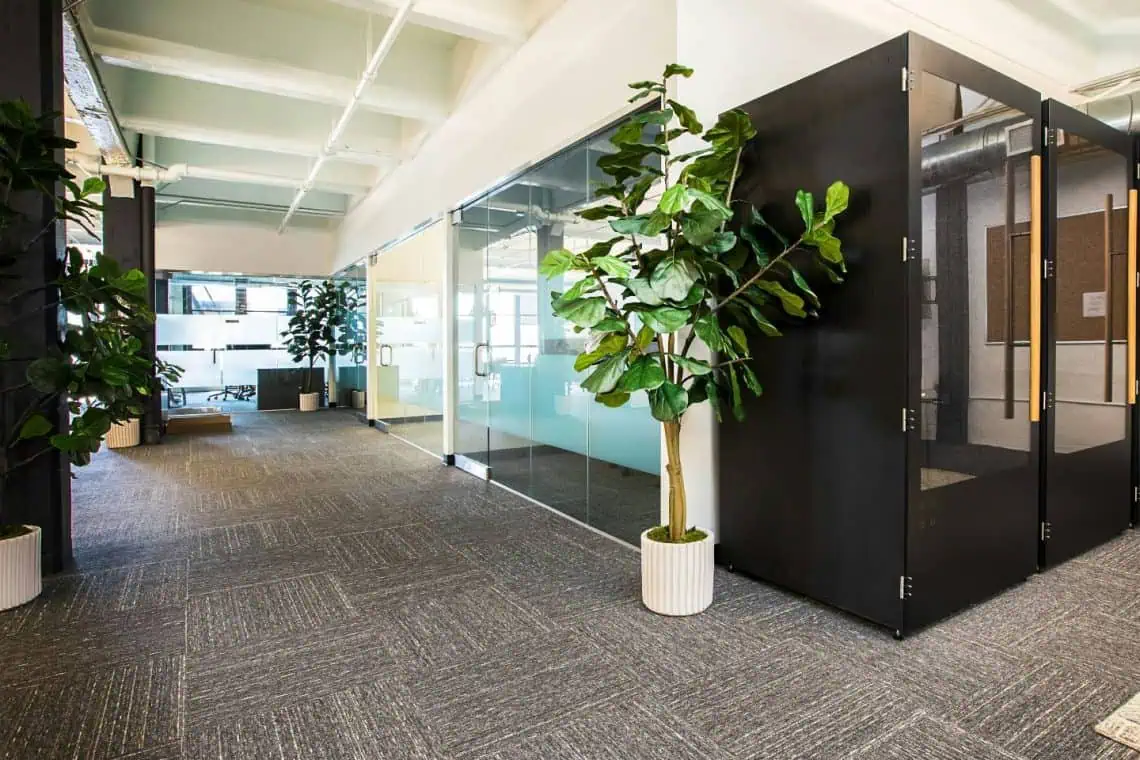As 2025 unfolds, Pretoria is leading a sustainable workspace revolution. Hybrid offices are blending remote and in-person work, incorporating artificial intelligence (AI) and eco-friendly designs to boost productivity, employee well-being, and environmental responsibility. This shift is driven by evolving work preferences and global sustainability goals. Flexible office spaces are rising as businesses adapt, with sustainability becoming a core focus in commercial real estate. Pretoria’s offices are embracing modular layouts, tech integrations, and green materials to create spaces that are innovative and planet-friendly.
The Rise of Hybrid Workspaces
Hybrid work models, allowing employees to split time between home and office, are gaining traction. South African companies are redesigning workspaces to accommodate this flexibility, with trends like intentional office use and remote-focused schedules emerging. Offices are expected to feature adaptable layouts that support collaboration on in-office days while enabling focused remote work. This model addresses the digital divide, ensuring equitable access through satellite broadband and smart devices.
Commercial real estate is adapting with flexible lease agreements and multi-use spaces. Businesses are prioritizing employee preferences, such as avoiding mandatory Mondays in the office, to enhance satisfaction and retention. Data shows that ergonomic, hybrid setups save costs and future-proof operations.
Integrating AI in Hybrid Offices
AI is reshaping hybrid workspaces, automating tasks and enhancing collaboration. By 2025, nearly all companies are investing in AI for workplace efficiency, with tools like AI agents managing hybrid teams at scale. AI-driven strategies optimize space utilization, predict maintenance, and personalize employee experiences.
AI features in productivity tools and collaboration platforms enable smarter scheduling, virtual assistance for well-being, and data analytics for better decision-making. The hybrid workforce—humans and AI working together—is the new norm, boosting efficiency in dynamic business environments.
Eco-Designs and Sustainable Materials
Sustainability is central to office design in 2025. Eco-friendly trends include using recycled materials, renewable resources, and biophilic elements to reduce environmental impact while promoting health. Offices incorporate certified sustainable woods, low-waste production, and non-toxic finishes to create healthier environments.
Green-certified spaces show higher well-being scores and cognitive function, emphasizing natural light, plants, and energy-efficient systems. This approach makes workspaces attractive to eco-conscious talent.
Acoustic Pods and Wellness-Focused Spaces
Acoustic pods are a standout trend in hybrid offices, providing soundproof spaces for focus amid open-plan layouts. These modular units reduce noise by 20–30 decibels, boosting productivity and cutting absenteeism costs. Combined with green materials like recycled fabrics and bio-based panels, they improve air quality and reduce stress.
Quiet zones and sensory-sensitive areas are becoming standard, offering privacy for calls or deep work. Integrating acoustics and sustainability fosters a balanced, healthful workspace.
Practical Tips for Startups
Startups can adopt hybrid models by starting with flexible leases and tech investments. Key strategies include creating inclusive remote technology, adjustable workstations, and collaboration zones. Emphasize employee well-being with ergonomic designs and clear policies.
- Invest in AI for task automation and space management.
- Use sustainable materials to attract talent and cut costs.
- Highlight hybrid skills on professional platforms.
- Consider month-to-month virtual offices for scalability.
These approaches help startups thrive in a hybrid workspace landscape.
Global Trends Shaping Hybrid Work
Hybrid work shifts in leading tech hubs offer valuable lessons. While in-person work remains important, flexible hybrid schedules improve collaboration and employee satisfaction. Tech-driven solutions, such as smart office tools, AI-assisted scheduling, and modular designs, allow businesses to scale efficiently while prioritizing well-being.
International innovations in smart office technology also influence African business hubs, enhancing connectivity, training, and infrastructure. By integrating these strategies, offices can create a modern, efficient, and sustainable work environment.
In conclusion, Pretoria’s hybrid offices in 2025 demonstrate a harmonious blend of AI, eco-designs, and global influences. By embracing these trends, businesses can create sustainable, productive spaces that prioritize people and the planet.
